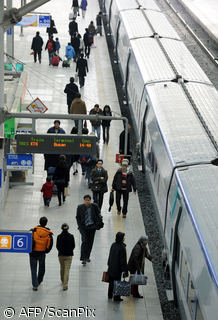Azerbaijan_s delegation to the latest round of talks in Turkey on the Baku Ceyhan oil pipeline project returned to Baku Wednesday evening.
Published:
3 March 2000 y., Friday
The expert working groups that took part in the talks, which began on February 26th, are carefully working out every point in the draft agreement between potential investors and Georgia accross whose territory the pipeline is due to pass, Natik Aliyev, president of Azerbaijani state oil company SOCAR, told reporters on Thursday. "All is being done to ensure the normal functioning of the pipeline over several decades," Aliyev said. Aliyev also said that the talks in Turkey had produced an agreement on one issue that had remained unresolved following talks in Georgia in mid-February.
As Interfax has learned from informed sources, until recently the main point of contention in the talks had been the issue of Georgia_s responsibility for pipeline security in force-majeur circumstances: natural disasters, terrorism or vandalism. The draft agreement contains a clause on "comprehensive damages" under which Georgia will be responsible for financing the costs of correcting damage to the pipeline within Georgia, as well as for paying compensation for damages to the consortium, including losses from lower oil production and idle tankers and refining capacity in Ceyhan. Georgia says it cannot afford to accept those liabilities. Officials in Tbilisi say the draft agreement is a threat to Georgia_s sovereignty and perhaps even its independence. If a terrorist attack were to take out one of three $55 million - $60 million substations in Georgia, the costs under the "comprehensive damages" clause would total at least $150 million.
Šaltinis:
Interfax
Copying, publishing, announcing any information from the News.lt portal without written permission of News.lt editorial office is prohibited.
The most popular articles
 The mission held constructive discussions with Prime Minister Emmanuel Nadingar, Finance Minister Gata Ngoulou, Infrastructure Minister Adoum Younousmi, and other senior officials.
more »
The mission held constructive discussions with Prime Minister Emmanuel Nadingar, Finance Minister Gata Ngoulou, Infrastructure Minister Adoum Younousmi, and other senior officials.
more »
 The EBRD is helping to improve the quality of power supply and stimulate renewable sources of energy in the Caucasus with an €80 million sovereign loan to Georgia for the construction of a new high voltage transmission line - the Black Sea High Voltage line, which will interconnect Georgia and Turkey.
more »
The EBRD is helping to improve the quality of power supply and stimulate renewable sources of energy in the Caucasus with an €80 million sovereign loan to Georgia for the construction of a new high voltage transmission line - the Black Sea High Voltage line, which will interconnect Georgia and Turkey.
more »
 The EBRD is helping to improve the infrastructure of the Georgian capital, Tbilisi, with a €100 million loan for the construction of a new railway route bypassing the city.
more »
The EBRD is helping to improve the infrastructure of the Georgian capital, Tbilisi, with a €100 million loan for the construction of a new railway route bypassing the city.
more »
 One of the men considered to be the founding fathers of the euro currency met MEPs on the Foreign Affairs Committee Tuesday (16 March) to talk about transatlantic relations.
more »
One of the men considered to be the founding fathers of the euro currency met MEPs on the Foreign Affairs Committee Tuesday (16 March) to talk about transatlantic relations.
more »
 European Trade Commissioner Karel De Gucht today opened a conference focused on the European Union's trade policy towards developing countries.
more »
European Trade Commissioner Karel De Gucht today opened a conference focused on the European Union's trade policy towards developing countries.
more »
 At the beginning of the 2000s, state ownership in financial intermediation in Mexico accounted for about 20 percent of the total credit of the banking system, provided through development financial institutions and funds.
more »
At the beginning of the 2000s, state ownership in financial intermediation in Mexico accounted for about 20 percent of the total credit of the banking system, provided through development financial institutions and funds.
more »
 Halving the number of business failures by offering individual support, doubling the number of young people who want to start their own business or raising by 500% the number of enterprising new cooperatives are just some of the projects nominated for the European Enterprise Awards 2010.
more »
Halving the number of business failures by offering individual support, doubling the number of young people who want to start their own business or raising by 500% the number of enterprising new cooperatives are just some of the projects nominated for the European Enterprise Awards 2010.
more »
 The European Commission has published the fourth call for proposals for the creation and upgrade of freight transport services under the second Marco Polo programme.
more »
The European Commission has published the fourth call for proposals for the creation and upgrade of freight transport services under the second Marco Polo programme.
more »
 The European Central Bank (ECB) today announced a programme of technical cooperation with the Central Bank of Bosnia and Herzegovina, in collaboration with a number of euro area national central banks (NCBs).
more »
The European Central Bank (ECB) today announced a programme of technical cooperation with the Central Bank of Bosnia and Herzegovina, in collaboration with a number of euro area national central banks (NCBs).
more »
 The EU disbursed today €1 billion to Romania, the second instalment of a €5 billion loan, which was agreed in May 2009 as part of a multilateral financial assistance package.
more »
The EU disbursed today €1 billion to Romania, the second instalment of a €5 billion loan, which was agreed in May 2009 as part of a multilateral financial assistance package.
more »